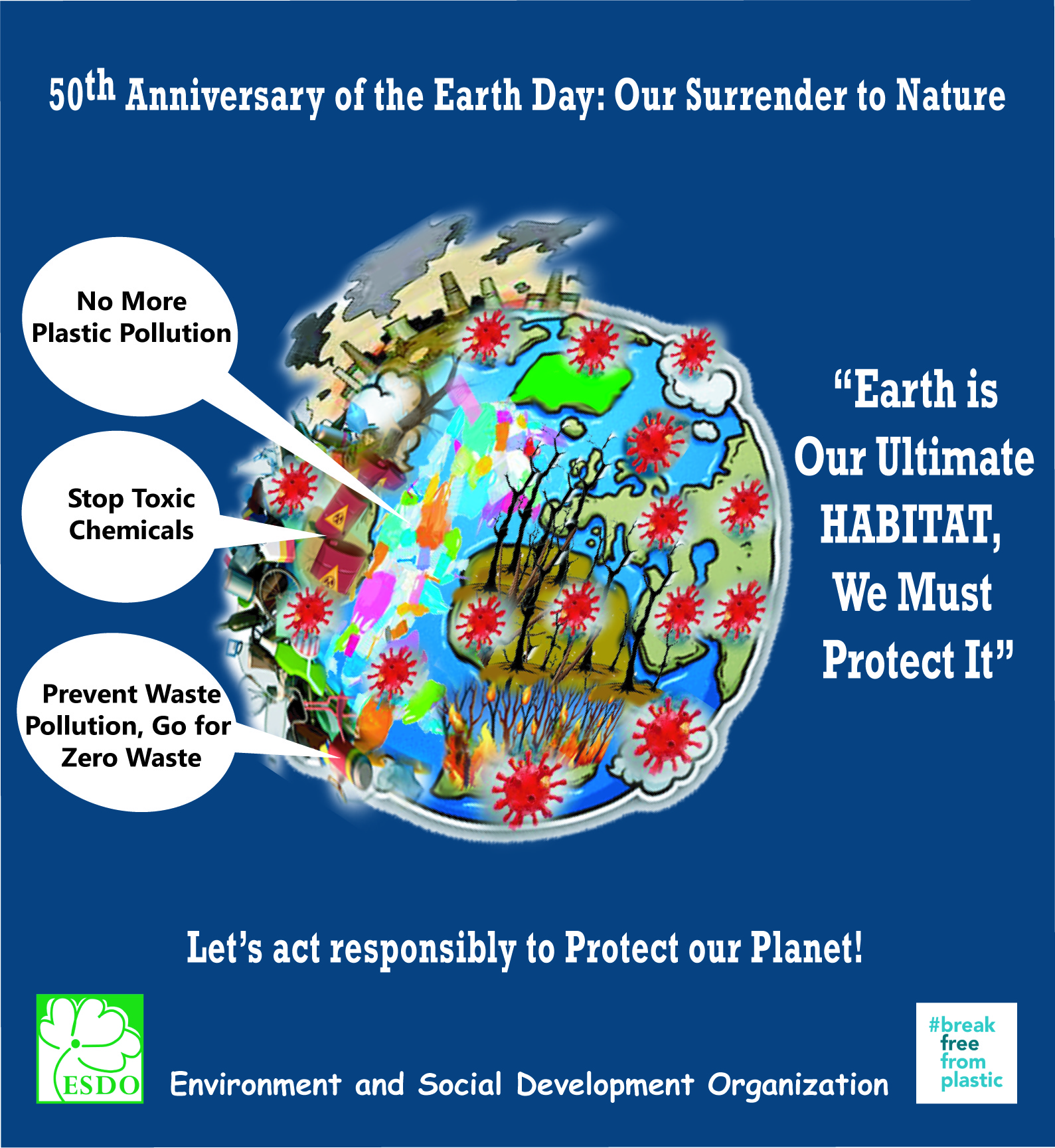Consuming Hazardous Single Use Plastic on Rise In Novel Corona Virus Pandemic

Attn:
Chief Reporter/ News Editor/ Head of News
Dear Sir/ Madam,
I request you to publish this press release in your reputed and widely circulated newspaper.
Sincerely,
Quazi Shahreen Haq
Media and Communication Officer
Environment and Social Development Organization- ESDO
Dhaka, Bangladesh,
22nd April, 2020.
Consuming Hazardous Single Use Plastic on Rise In Novel Corona Virus Pandemic
22nd April, 2020, Dhaka: The Earth Day is observing 50th anniversary of this global movement. But this grand occasion of celebration comes in a situation when the world is adjusting to the new reality of living with the COVID-19 pandemic to fight with,
Fifty years ago, Earth Day became the people’s largest protest in the history of the world. And that changed the world for the better, by creating clean air and clean water laws—with the help of scientists, policy leaders, and a movement that couldn’t be stopped.Today’s environmental threats of extreme climate change, pollution to our air and water can feel overwhelming.
Environmental and Social Development Organization (ESDO) has observed the Earth Day every year since the formation of the organization with awareness campaign activities. This year the campaign takes place indoors with the online platform amongst the COVID-19 pandemic situation. A poster, factsheet and COVID-19 awareness infographics have been released on the occasion.
The Earth Day should not be seen as a deadline but rather a spark that inspires future action. This year on Earth Day,a project is being launched on a global platform with two research areas—plastics and air quality. These researches are hoped to contribute to existing environmental data to help promote better environmental policies, ranging from single use plastic bans in local communities to monitoring progress against the United Nations’ Sustainable Development Goals (SDGs).
During the COVID-19 outbreak,which on a positive perspective has shown the importance of conservation of nature and environment to the human kind, unfortunately disposable single use plastic (SUP) bags are making a comeback as some people fear that reusable bags could spread the disease.
Before the pandemic, a growing number of governments banned single-use plastic bags in an effort to cut down on waste. But as the novel coronavirus has spread around the globe, people have gotten leery about coming in close contact with other people and their possessions, including reusable bags. On March 31st, New Hampshire became the firststate in the US to temporarily ban reusable bags during the pandemic.
Recently a research report published in the New England Journal of Medicine, described the stability of the novel coronavirus, SARS-CoV-2.The report said the virus can remain stable for about four hours on copper, up to 24 hours on cardboard, and for 72 hours on plastic and stainless steel. This means shoppers may come in contact with the virus handling disposable single use plastic bags, too. World Health Organization (WHO) also has reiterate these facts regularly.
Also the COVID-19 pandemic has had a profound impact on the way we handle our waste and its impact on those that are most vulnerable to its exposure. For millions of people who make a living in the informal sector, isolation measures that guarantee their safety pose a dramatic threat to their livelihoods. People in the informal waste sector, are now facing a grave threat. 15 lakh informal waste workers and their families risk losing their livelihood due to the current pandemic. Those who do the critical yet thankless role of collecting and sorting our waste and recyclables without formal recognition and protections from their municipalities, are now also out of food, and thus forced to go back to their work mostly without sufficient protection.
On the other hand, any kind of plastic product is non-biodegradable which poses even greater threat to the environment and public health. A plastic grocery bag adrift in the ocean can take up to 20 years to decompose. A plastic bottle could stick around for up to 450 years, according to estimates from the National Oceanic and Atmospheric Administration of USA. The fact that these all contribute to the Global Warming phenomena, which is also connected to the rapid spread of many diseases up to certain extents.
The concerning spike in Single Use Plastic (SUP) products due to Novel Corona Virus outbreak overall could make public health even more susceptible to get weaker in immunity to the infection.
The environmental activist organizations around the world including Environment and Social Development Organization (ESDO) is urging everyone to think about the lifestyle choices which are harmful to the planet we are living in, and to embrace an environment friendly lifestyle. Environment and Social Development Organization (ESDO)
House # 8/1, Level# 5, Block# C, Lalmatia
Dhaka 1207, Bangladesh.
For further information, please contact;
Dr. Shahriar Hossain
Email: shahriar25@gmail.com
Quazi Shahreen Haq
Tel: +880-2-9122729
Cell: +880-1711636175
Email: info@esdo.org


